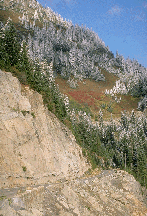
Please read pages indicated by Z-23 and study Behavioral Objective #35. We have seen that moving north or south on the earth's surface one may pass through a series of different biomes. The same thing is true if one moves vertically up the slopes of tall mountains. Climatic conditions change with altitude and the biotic communities change correspondingly. In very high mountains the following zones can be identified: snow-capped peaks(polar), alpine region (tundra with permafrost), taiga (pines), temperate forest (deciduous) and tropical forest. Thus, arms or isolated pockets of the taiga extend far south in the United States on the slopes of the Appalachian Mountains in the east and of the Rockies and coast ranges in the west. There are even tundra-like spots on the highest peaks.
Descending down a mountain a hiker will pass through various altitude zones. These zones develop because of ________.
- a. location to sun
- b. amount of minerals in soil
- c. temperature changes
- d. different amount of rainfall
- e. both c and d
Which of the following lists the correct order of vegetation zones a hiker would pass through descending a high mountain in Central America?
- a. ice, tundra, deciduous forest, coniferous forest, tropical forest
- b. ice, coniferous forest, deciduous forest tundra, tropical forest
- c. ice, tundra, coniferous forest, deciduous forest, tropical forest
- d. tundra, ice, coniferous forest, deciduous forest, tropical forest
Created by the Multimedia Development Lab, Academic Technology Services.
Last modified November 19, 1997.